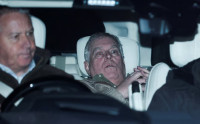Columns
Struggle for education in Britain
Hilary Kassman wrote poems about subjects that strike a chord with everyone's sense of belongingness.
Abhi Subedi
It would be revealing to recall and review briefly the history of how Tribhuvan University used to treat its academics, especially the tenured lecturers who went abroad for higher studies under some form of fellowship. In the early phase, scholars went abroad for studies only under fixed grants and scholarship.
However, the conditions changed. Scholars started going abroad on their own initiatives. A certain number of those who were sent to America, Canada or Australia under scholarships never returned. In our times, and to a limited extent even today, the British Council, the Fullbright commission and the East-West Centre of America have been at the forefront in granting scholarships. This subject requires some study, which of course must have been made at different times.
In general, the relationship of the Tribhuvan University bureaucracy with such scholars was one of indifference or of mere record maintaining. The early stage of such an exodus of scholars was quite significant both in terms of numbers and subject training. Many scholars from different faculties of the university were trained abroad. These scholars who specialised in the subjects of the humanities and social sciences, education, management and pure science did play important roles at different periods of the university's history. Some of them even started their own universities. Kathmandu University is one such example. The impact of such training and education from foreign universities in the early period is worth noting in terms of significance and fulfilment of educational needs in Nepal.
But there are individual stories too. I want to recount my own experience of dukha that I had to endure as one such scholar, a tenured lecturer at Tribhuvan University who went to study under a British Council scholarship to the University of Ediburgh in 1978. Everything was hunky-dory in the first phase of my study. But I had to face a double whammy when I was moving on to the next phase after completing one post-graduate degree.
Political history was changing in Britain. Margaret Thatcher became the prime minister in May 1979 following a landslide victory for her Conservative party in the election. Foreign scholarships and grants were cut under the policy of the new government. Dismayed, I rushed to meet the very helpful and kind people of the British Council in Edinburgh. They said they would extend my scholarship if my university requests them for that. Confident, I wrote to my university for such letter and study leave for the same. To my utter astonishment and shock, Tribhuvan University turned down my application. It was total bureaucratic malice—something I fail to understand even today. I had no option but to return. I informed my friend, the British Nepali historian John Whelpton (who lived in London) and others. A small incident changed all that.
I was attending a poetry reading one evening in Edinburgh, which has always been famous for that, where I met one bright and friendly poet named Hilary Kassman who also recited her poems there. She was a good poet. In the drift of the conversation, I told her about my situation. To my great surprise, she said, ‘wait for some time. I'll ask my mother if she can help you.’ That struck me like a fairy tale. I was asked to remain in contact with her.
Hilary had asked her mother Sheila Kassman, a renowned medical doctor who had agreed to pay my fees for one academic year and give me some help towards paying the hostel fees. I registered for the course and continued my study. After several months, Hilary phoned me to go to her place in Fountain Hall near the Scottish border to meet her mother who was visiting her. Sheila looked as though I had always known her. She drove me to the nearby hill in the sun-drenched chilly afternoon. We stopped to see the view. Sun filtering through the branches of the coniferous trees was making exquisite patterns on the street. Sheila said, ‘Abhi, look at the beautiful patterns. Life is so beautiful. I don't know if Hilary has told you, I have blood cancer, much advanced already. I have only a few months to live. You should try to complete your studies.’ The third whammy was an admixture of pain, poetry and humanity that made me cry. I don't remember if I phoned John about this meeting that day. I have written this story in my essay collection Carpet tangieko aakaas (1998).
I went to London to meet Sheila in the hospital. It looked as though the mellow sun of life was shining on her face. I returned to Scotland after Sheila died. Hilary had lost her last supporting person. John visited Scotland if I remember correctly, more often. He became a great friend to Hilary, too. I completed the course with a small grant that the Hornby Dictionary Foundation sent to me at my request. John and Hilary came to say goodbye to me at Heathrow airport. Hilary bade me an emotional farewell. After some years I completely lost contact with Hilary. John followed his studies in Nepali history. To him, Nepal is like his second home. John returns every year for his research. He has his books, and a room, in our house. We also meet regularly via zoom with friends.
Some days ago John sent me a sad piece of news about the death of our mutual friend Hilary Kassman, which had occurred on August 28, 2020, somewhere in England. To find out why his card sent to her had returned, John had browsed through the net and had found information about her demise.
Hilary wrote poems about subjects that are simple but strike a chord with everyone's sense of belongingness to nature and to the profound world of art. As I don't have any collections of her poems that must have been published since I left Britain in 1980, I am saying this on the basis of my deep familiarity with her poetry writing and her choice of themes.
Hilary drew from her enduring experience of being free and her travels with the dreamers in the late sixties. She confessed, however, that she could not make it to Nepal, though she had a strong desire to do so. A young and unprepared person, she had to decide to return after visiting Afghanistan. Though she was a daughter of an eminent philosopher and professor, Alex Kassman of the University of Oxford, Hilary always rejected the academic and elitist concept of life and the world. That was the trend and power of the youths of her generation. Hilary's sense of resistance was non-violent, enduring, calm and poetic
I pay tribute to Hilary, a great soul, poet and friend.




 8.75°C Kathmandu
8.75°C Kathmandu















